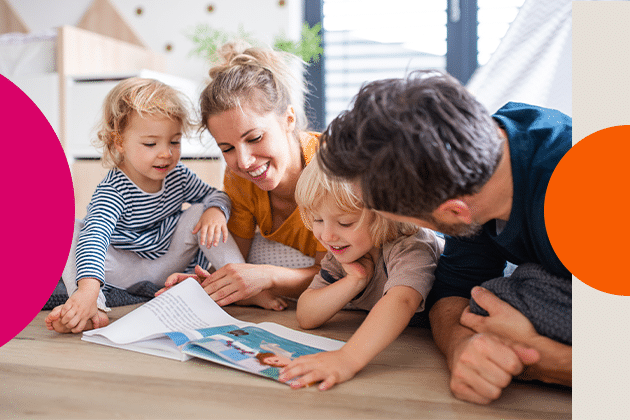We all want to set our children up for success at school. Luckily, reading picture books to your children is a fun and easy way to ensure they start out on the right foot.
MultiLit Research Unit research fellow, product developer and author Dr Anna Desjardins (Notley) tells us why it is so important to read aloud to children from a young age.
Why is reading to children so important from a young age?
AD: In the early years at school, children ‘learn to read’. In later years, they must ‘read to learn’. Reading is critical to success in every other subject area. Building strong oral language skills in the early years, and giving children positive reading experiences, will set them up to enjoy books and reading.
This is more important than it might sound — motivation is a critical factor related to reading success. The more motivated children are to read, the more they will read; and the more they read, the better they get at reading!
How does reading picture books to children help them develop their own skills?
AD: Picture books can be used to teach children all kinds of important literacy skills without them even noticing!
Books typically contain more interesting vocabulary and longer, more complex sentences than children are exposed to in conversation. Children benefit just from hearing this language read aloud, and even more so from actively engaging with the story.
When reading to your child, ask them questions about the events in the story, comment on the pictures and explain interesting words. This experience will help to build your child’s oral language and understanding of narrative structure, and better prepare them for reading on their own when the time comes.
Why is oral language so important from an early age?
AD: Oral language forms the foundation for understanding anything and everything that we read. Reading involves translating strings of printed symbols into words we recognise in our spoken language. We can then use our language comprehension skills to understand what we read.
As it is such a critical factor in reading comprehension, weak oral language can put children at a significant disadvantage as they begin to read and write. Weak oral language can affect not only a child’s journey to becoming a confident reader and writer, but also their behaviour, emotional and social well-being, and long-term academic success.
At what age should parents begin reading with their children and why?
AD: Children begin acquiring oral language from birth (and even in utero). Books can be added to this picture as early as parents wish.
Even before they are able to sit and take in a story, very young children who are exposed to board books will begin learning some very basic concepts like what a book looks like and how we turn the pages. As children become more able to engage with books, parents can also point to the print as they read, allowing children to begin to understand that the squiggles on the page are important.
Parents should certainly be reading to their children in the preschool years (around age 2-5). In these years, oral language is exploding and picture books will support this. Before they start school is an important time to spark children’s interest in books in preparation for the literacy journey ahead.
Are there any other benefits of reading picture books together?
AD: Of course! Reading pictures books together can just be lots of fun. Engaging in a shared activity together also builds important social and emotional bonds.
About LanguageLift and Putto Press
LanguageLift is a narrative-based oral language intervention program developed to provide support for children who come to school with weak oral language. Built around a series of picture books, activities work on children’s vocabulary, grammar, listening comprehension and story retelling skills.
The LanguageLift picture books by Putto Press have been specially designed for the program, yet can be enjoyed at home. Each book highlights typical narrative story structure, and includes interesting words and grammatical structures to help build children’s oral language.
Perfect for young children, the LanguageLift picture books stand alone as charming and engaging stories that can be read aloud to any child.

